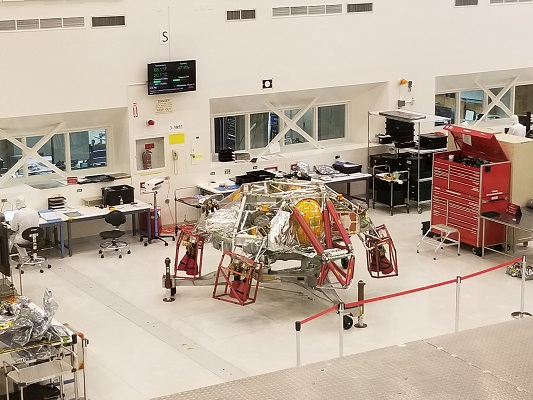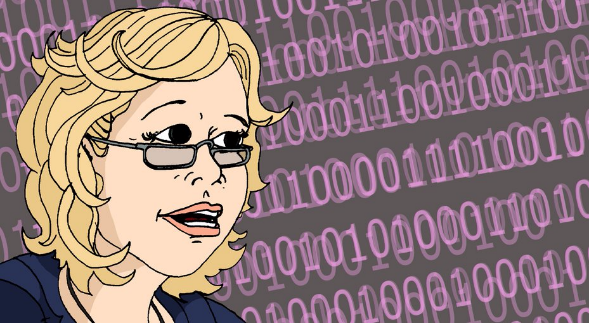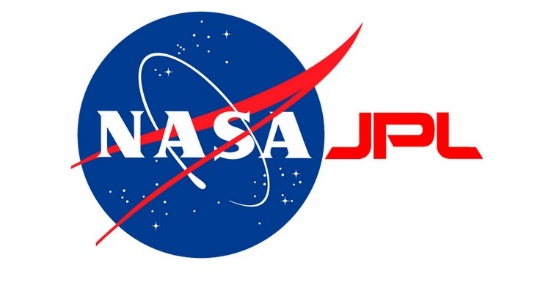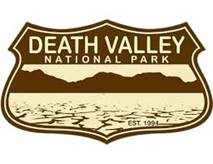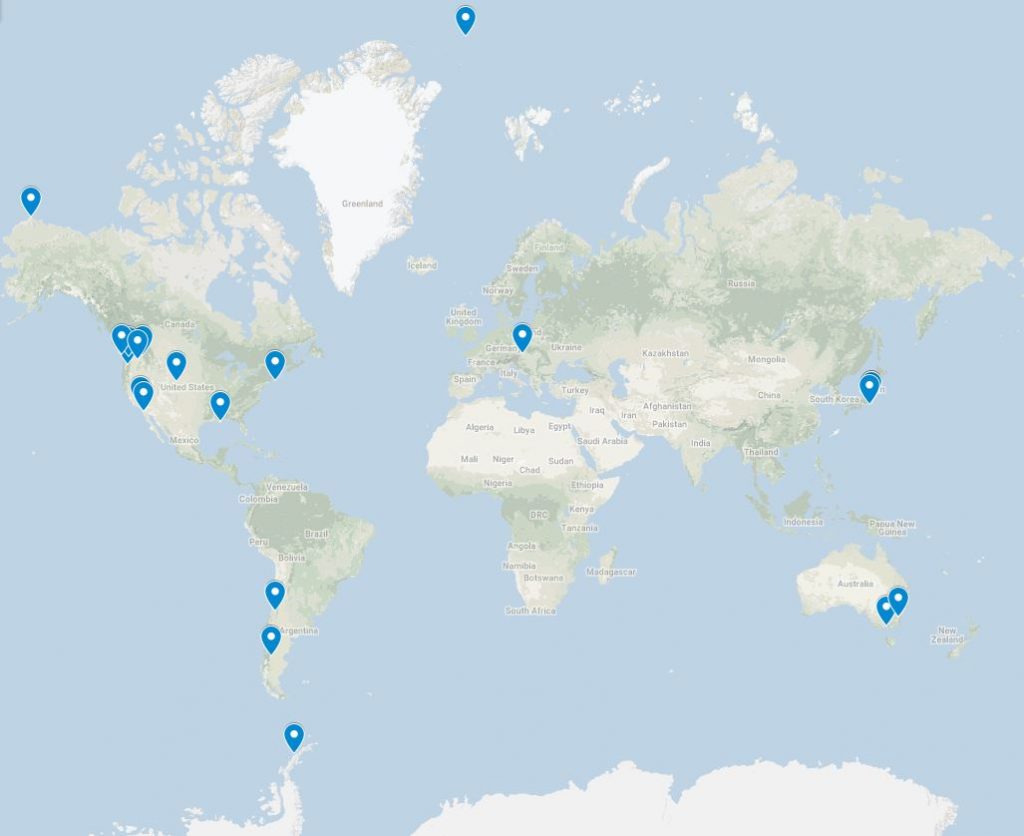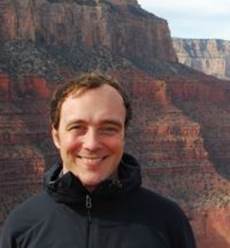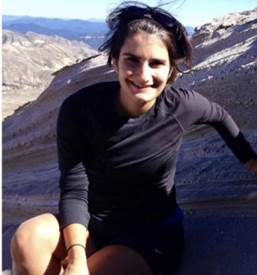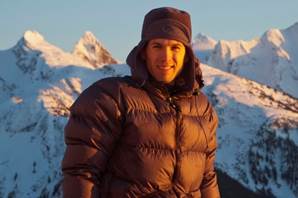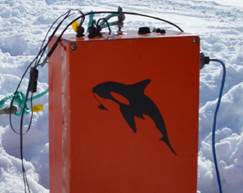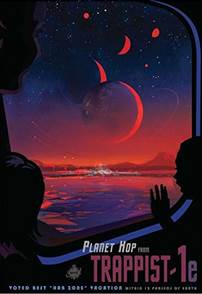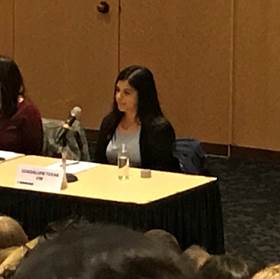A Word from the Director
This year the UW Astrobiology Program has continued to advance the search for life in the Universe through both our research and our science leadership. UW Astrobiology faculty and students were involved in exciting new discoveries about Mars, Enceladus and Europa, provided new constraints on the composition and atmospheres of terrestrial exoplanets, and explored our own planet from pole to pole and throughout deep time. UWAB personnel were also involved in national efforts to map the future of exoplanet science and astrobiology, and had key roles in two new National Academy of Sciences strategies on Astrobiology and Exoplanets.
Our biggest news for the Astrobiology Program this year was NASA’s $11M award to continue the work of the UW’s Virtual Planetary Laboratory (VPL) for the next 5 years (an award that also indirectly funds the UW Astrobiology Program through University matching). The VPL is also now part of the new NASA Nexus for Exoplanet System Science research coordination network, in which I will play a new leadership role. The VPL also made major impacts on the field of astrobiology this year by identifying and promoting the importance of environmental context for both the assessment of the habitability of exoplanets, and the robustness of life detection techniques, themes that were picked up in the NAS reports.
UWAB faculty and students are also supporting the NASA Transiting Exoplanet Satellite Survey (TESS) mission and the James Webb Space Telescope (JWST). TESS launched successfully in April, and we offer our congratulations to Astronomy professor Eric Agol, who is a Science Team member on that mission! Although the delay of the launch of the James Webb Space Telescope to 2021 has been a disappointment, it’s nonetheless inspired us to use this extra time wisely. We look forward to training the scientists needed to understand how best to take observations of habitable zone exoplanets with JWST, and to interpret the data that JWST, and other new telescopes, will return. Read More >>
2018 Drake Award
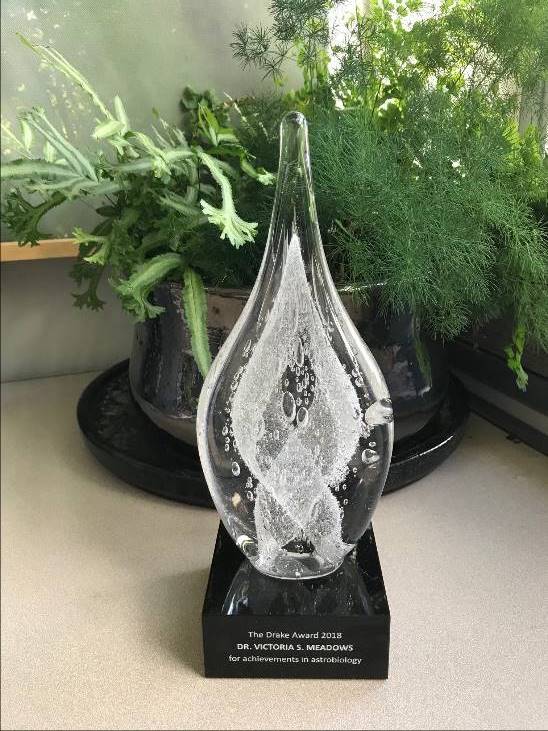
On June 14, at a ceremony at SRI International in Menlo Park, CA, Prof. Victoria Meadows was awarded the 2018 Frank Drake Award for her contributions to the field of astrobiology and the understanding of life in the Universe!
“The SETI Institute’s prestigious award is named for Dr. Frank Drake, the pioneering astronomer who founded the modern field of experimental searches for intelligent civilizations among the stars, and the first President of the SETI Institute’s Board of Trustees. Previous winners of the Drake Award include Charles Townes, a Nobel Prize winner for his work on developing masers and lasers, and William Borucki, the Principal Investigator for NASA’s Kepler mission, which has discovered thousands of exoplanets, including many with the possibility of sustaining life. Meadows will be the first woman to receive the Drake Award.”
Read the UW Press Release Here or the feature in Quanta Magazine
The 2017 & 2018 Annual Astrobiology Workshops
A significant focus of the UW Astrobiology’s graduate program is to provide our students with opportunities for hands-on interdisciplinary research experiences, and in-the-field learning.
Our annual workshops are multi-day educational field trips and are a centerpiece of the interdisciplinary training in our Program.
Our 2017 workshop (held in winter quarter 2018) took us to Pasadena California to visit NASA’s Jet Propulsion Laboratory. During this workshop students learned about the astrobiology-relevant science, and state-of-the-art technology needed for JPL’s robotic exploration of the solar system and observations of exoplanets, and got to talk to scientists from a range of backgrounds about their jobs and work at JPL. During this trip students toured labs and mission command centers, and participated in a special “A Team”-guided brainstorming session to design a mission to Mars. Students obtained professional development advice about the career paths that JPL scientists took from graduation to where they are now. Fun fact: Most of them didn’t take a straight line like they expected, or even stay in the field of their dissertation! Click here to see photographic highlights of our JPL workshop>>
More recently, our 2018 workshop was a 4-day exploration of Death Valley and the surrounding Mohave Desert. The trip was hosted by one of the foremost experts on the area, UW ESS Professor Darrel Cowan (who has dedicated most of the last 30 years to studying it), along with fellow UW ESS Professor Roger Buick. During this workshop students got to see and touch well preserved geological evidence for past glaciation periods, active tectonic faults, ancient lake beds, modern day life in extreme environments, and fossilized records of early life on earth. Additionally, the students were able to assist fellow UW Astrobiology student, Eliah Overbey, in gathering soil samples to bring back to the UW for later DNA sequencing. The project is partly funded by generous donations from our local Friends of Astrobiology and will be one of the first analyses ever done of the microbes living in the extreme environments of Death Valley! Read More >>
UW Astrobiology Colloquium
We’re just now wrapping up our Autumn 2018 Colloquium series and both it and our Spring 2018 series, organized by postdoctoral Research Assistant Dr. Kim Bott, have been a great success!
For the Spring Series We had the pleasure of visiting with and listening to lectures from several of our own students and postdocs as well as guests: Dr Niki Parenteau (NASA Ames Research Center), Dr. Rika Anderson (Carleton College), Dr. Evgenya Shkolnik (ASU), Dr. Carrie Albertin (U Chicago), Dr. Sarah Stewart Johnson (Georgetown University, and Dr. Tara Djokic (UNSW)!
And for our Autumn Series we were thrilled to host Dr. Carol Paty (U Oregon), Dr. Brad Foley (Penn State), Dr. Peter Gao (UC Berkeley), Dr. Rachel Osten (STScI), Dr. Cayman Unterborn (Arizona State), Dr. Noah Planavsky (Yale), Dr. Betul Kacar (U of Arizona), and Dr. Natasha Batahla (UC Santa Cruz).
If you missed one of these amazing talks you can watch them anytime on the NASA Astrobiology Institute’s website or, starting with this Autumn’s series, you can now find the presentations on our UW Astrobiology YouTube Channel!
NASA & UWAB Celebrate the Successful Launch of TESS
NASA’s latest planet hunter, the Transiting Exoplanet Survey Satellite, successfully launched on April 18 from Cape Canaveral Air Force Station in Florida on board a Space X Falcon 9 rocket.
The 2-year mission is planned to observe over 200,000 nearby stars looking for the faint dip in brightness caused by transiting exoplanets. With the data TESS gathers on these exoplanets, astrobiologists hope to perform detailed characterizations of the planets and their atmospheres.
Want to know more? Read this article from one of the UW Astrobiology Program’s very own exoplanet hunting experts Dr. Eric Agol.
Where in the World Are Our Astrobiologists?
Ever wonder where you might go or what you might see as an Astrobiologist?
Perhaps to an Ice cave in the northernmost reaches of Alaska? Maybe to the highest peaks of the Andes mountains? How about Antarctica, Australia, or even prison?
Well that’s where our Astrobiologists’ research and outreach have taken them these past six months.
Check out these and all of the other exciting places our faculty, students, and alumni have been to over the last year!
See the Pictures and Read More >>
Alumni Spotlight
The UW Astrobiology Program has graduated over 40 alumni, who have exciting careers as faculty members, NASA scientists, university researchers, industry specialists and entrepreneurs. In this Newsletter we highlight two of our alumni who are directly and significantly contributing to the search for life on Mars!
Dr. Ken Williford (ESS & Astrobiology, 2007) is currently working at JPL where he runs the Astrobiogeochemistry Lab (or abcLab for short) as well as serving as the Deputy Project Scientist for the upcoming Mars 2020 rover mission!
Want to know how he got from being a UWAB grad student to where he is now? Read this interview to find out! Read More >>
Not far from Dr. Wiliford at JPL another UWAB Alumni, Dr. Elena Amador (ESS and Astrobiology, 2017) is setting some high standards for future UWAB graduates to follow with her postdoctoral scholar position at CalTech’s Division of Geological and Planetary Sciences.
When Elena’s not doing field work with her team in Iceland, she’s hard at work studying the abundance, diversity and distribution of carbonate minerals on Mars, contributing as a member of the Mars 2020 science team.
Want to hear more of research and how she got to where she is? Read this interview to find out! Read More >>
Faculty Spotlight
Please extend a warm welcome to our newest AB research faculty member, Dr. Jonathon Toner(ESS).
Dr. Toner came to the University of Washington to study Geophysics as a grad student and hasn’t left since (and can you blame him?).
Although he’s spent time doing research in Antarctica and climbing just about every mountain in the Seattle area, Dr. Toner’s greatest adventure has just begun as he and his wife just welcomed their first child, Ellie, on March 30th of this year.
Research Rotations
The UW Astrobiology Program’s Dual-Titled PhD requires students to spend one or more quarters working on an interdisciplinary research project that is outside of the bounds of what they would normally be doing for their research in their home department. Recently two of our outstanding students participated in their research rotations and provided reports for us here!
SHAMPOO for SHAMU
Brett Morris (Astronomy) joined Dr. Jody Deming’s research group as they travelled to remote reaches of Greenland where they tested their Submersible Holographic Astrobiology Microscope with Ultraresolution (SHAMU) to analyze microbial motility and its qualification as a biosignature of extant life. Brett’s largest contribution to the project came from his development of SHAMPOO, the only free and open source numerical holographic reconstruction toolkit in Python!
The Detectability of Biosignatures in Anoxic Atmospheres with the James Webb Space Telescope
Josh Krissansen-Totton (ESS) opted to travel to the not so remote reaches of Oxford, UK to join Dr. Patrick Irwin and his team to answer the question of which atmospheric gases, besides oxygen, can reveal the presence of life on an exoplanet. While in Oxford, Josh spent his time developing simulations of exoplanet atmospheres and determining how well the upcoming James Webb Space Telescope (JWST) might be able to observe and reconstruct these atmospheres.
Beyond the Science
Not only are our astrobiology students becoming amazing scientist and leaders in their fields of research, but they are also developing as leaders in other communities and organizations. This past spring Lupita Tovar (Astronomy) was selected to serve on a panel for Women’s Economic Empowerment – Breaking Gender Barriers and Advancing Equity.
Give A Gift
Are you excited about the field of Astrobiology and want to help support it? Are you one of the UW Astrobiology Alumni, or have you in some other way benefited from the program and its work? If so, why not give to the program to help us train the next generation of emerging astrobiologists?
As we come to a close on this fantastic year of scientific accomplishment and academic success, now is a great time to give a gift in support of UW Astrobiology Program!
Use the secure, online portal to support UWAB today.
UWAB at a Glance
- Matt Tilley graduated with a Dual-Title PhD in Earth & Space Science and Astrobiology, and is currently working as a postdoc with UWAB Professor David Catling to understand the environmental conditions that might have influenced the origin of life on Earth
- Jonathan Bapst graduated with a Dual-Title PhD in Earth & Space Science and Astrobiology and is now working as a postdoctoral fellow at the NASA Jet Propulsion Lab
- Nichole Barry graduated with a Graduate Certificate in Astrobiology and her PhD in Physics and is now a postdoctoral fellow at the University of Melbourne, working with Rachel Webster on detections of cosmological signals.
- Chloe Hart graduated with a Dual-Title PhD in Earth & Space Science and Astrobiology and is now an adjunct faculty member at Urbana University as well as their Science Laboratory Manager.
- Matthew Koehler graduated with a Dual-Title PhD in Earth & Space Sciences and Astrobiology and is heading off to be a postdoctoral research for Global Viral working at JPL/Caltech with UWAB Alumnus Ken Williford on metabolic diversity and boundaries of life on the early Earth.
- Anna Simpson graduated with a Dual-Title PhD in Environmental & Forestry Sciences and Astrobiology
- Erik Goosmann graduated with a Master’s of Science in Earth & Space Sciences and a Graduate Certificate in Astrobiology
- Aaron Brewer graduated with a Dual-Title PhD in Earth & Space Sciences and Astrobiology
- Dr. Jon Toner has joined the ESS department and the Astrobiology Program as a Research Faculty member
- Please welcome our newest students who entered the UW Astrobiology Program this fall:
- Mile Currie (Astronomy)
- Lucas Fifer (ESS)
- Eliah Overbey (Genome Science)
- Susan Rundell (Oceanography)
- Andrew Shumway (ESS)
- Nick Wogan (ESS)
Astrobiology in the News
- Dr. Eric Agol (Astro) contributed to “The Nature of the TRAPPIST-1 Exoplanets” publication, which uses transit-timing variations to improve our knowledge of the TRAPPIST-1 planetary masses and densities, which in turn tells us that these planets may be rocky but with more water than the earth. Read the Full Article
- Two microbial strains, originally isolated by Dr. Sharon Doty (SEFS) from within wild willow plants at the Snoqualmie River, were launched into space on May 20, 2018 for an experiment on the International Space Station. Read the Full Article
- Brett Morris (Astro) published a research note: “Large Starspot Groups on HAT-P-11 in Activity Cycle 1″ that was featured in Astronomy Magazine. Read the Full Article
- Victoria Meadows and her local team members of the NASA Virtual Planetary Lab were highlighted in the Autumn 2018 edition of Perspectives, the College of Arts and Sciences’ newsletter. Read the Full Article
- UWAB Grad Student Osazonamen Igbinosun was featured in a UW News article titled: “Undaunted Courage”. Read the Full Article
Science Highlights
- Andrew Lincowski (Astro) has a new paper which was accepted recently by the Astrophysics Journal, which was also featured in a recent UW News Article, titled: “Evolved Climates and Observational Discriminants for the TRAPPIST-1 Planetary System.” Read the UW Press Release
- Oceanography and Astrobiology students Hannah Dawson and Susan Rundell recently worked at Palmer Station, Antarctica, sampling sea ice algae as part of a NSF funded project. They posted blogs and other updates on their work on twitter (@uw_young), as well as instagram (youngalgae)!!
- UWAB and VPL Team members led or contributed to six papers in a special issue of the Astrobiology Journal that focused on reviews and advances in the field of exoplanet biosignatures!
- Drs. Meadows and Catling led two of the papers, and Josh Krissansen-Totton, Andrew Lincowski, Jake Lustig-Yaeger, Russell Deitrick co-authored, along with UWAB alumni Eddie Schwieterman (paper lead) and Giada Arney and Shaun Domagal-Goldman. Read the UW Press Release
- Osazonamen Igbinosun(A&A) has a new paper which was accepted recently by Applied Spectroscopy, titled: “In Situ Measurements of Water Content for Sub-Surface Planetary Applications, using Near-Infrared Internal Reflection Spectroscopy (IRS) with a Multimode Optical Fiber“
- David Flemming’s (Astro) new paper, “On the Lack of Circumbinary Planets Orbiting Isolated Binary Stars“, was accepted by the Astrophysical Journal (ApJ)
- Owen Lehmer(ESS) published a paper on “The Productivity of Oxygenic Photosynthesis around Cool, M Dwarf Stars”
- Jim Staley has been working on the evolution of organisms and has recently published a paper on Domain Cell Theory.
Congratulations
- Prof. Victoria Meadows led a successful proposal to NASA for continued funding for her Virtual Planetary Laboratory research group, which focuses on exoplanet habitability and biosignatures. The team now has a further 5 years of research funding, and indirect costs from this award help to keep the UW Astrobiology Program afloat!
- Prof. Victoria Meadows also participated in two National Academy of Sciences Committees on the science strategies for Astrobiology and Exoplanets, and was nominated as the Chair of NASA’s community Exoplanet Analysis Group (ExoPAG)
- Prof. Jody Deming (Ocean) was recently awarded a $500,000 grant from the National Academies Keck Futures Initiative for her Ocean Memory Project, which focuses on building a thriving community of interdisciplinary researchers focused on the theme of Ocean Memory Read the UW Press Release
- Profs. Jonathon Toner and David Catling (ESS) have been awarded a new 3-year NASA Habitable Worlds grant for a project with the title, “The Composition and Habitability of Enceladus’ Ocean“. The project uses experiments and theoretical models to understand the chemistry of Enceladus’ ocean based on measurements of erupting plumes by orbiting spacecraft.
- UWAB Alumnus David Smith, now at NASA Ames Research Center, won a NASA grant for his team to examine how spacecraft-associated bacteria could be influenced by radiation levels expected on a long duration mission to Mars, and if any changes pose a potential risk to astronauts.
- Prof. David Catling(ESS) won an award for Outstanding Researcher in the College of the Environment
- Prof. Jodi Young (Ocean) was awarded a UW Innovation Award to develop an artificial, laboratory-scale, sea-ice system that mimics the seasonal formation and melt of Arctic sea ice.
- Marshall Styczinski was awarded a NASA Earth and Space Science Fellowship (NESSF) for his work on applying multi-fluid plasma models to Europa.
- Zack Cohen (Chemistry) was selected as an NSF Graduate Fellow through their Graduate Research Fellow Program (GRFP)
- Michael Diamond (Atmos) was recognized as a member of the Husky 100
- Michael Kipp (ESS) was awarded the Robert and Jenny Winglee Endowed Graduate Support Fund as well as the Space Physics Fellowship Support Fund
- Addien Wray (ESS) was awarded the Richard E. Fuller Endowed Fund
- Jana Meixnerova (ESS) was awarded the Peter Misch Fellowship
- Steven Sholes(ESS) was awarded the George Edward Goodspeed Geology Scholarship as well a Peter Misch Fellowship
- Joshua Krissansen-Totton (ESS) received the David A. Johnston Award for Research Excellence and the 2018 UW College of the Environment Graduate Dean’s Medalist Award for outstanding academic achievement
- Brett Morris (Astro) was awarded the 2018 Astronomy Department Graduate Student Research Prize.
- UWAB Alumna Dr Giada Arney won the NASA Early Career Award

